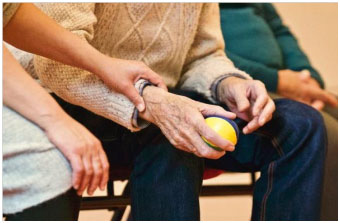
Safeguarding adults
This short course looks at local and national guidelines for safeguarding adults. Learn about principles of safeguarding, positive care provision, and person-centred care. Protecting people’s health, wellbeing, and human rights should be at the heart of every care setting. Your setting will have safeguarding policies and procedures; you should know and understand these.
Learning outcomes
- The importance of knowing, understanding, and following the safeguarding policies and procedures at your setting is outlined to learners
- Learners will know how to protect people’s health, wellbeing, and human rights
- Abuse and neglect will be defined, and learners will know how to spot the signs and symptoms, and be able to react appropriately
- Learners will understand the term ‘vulnerable person’
Advantages of this course
- The principles of safeguarding states that every person has the right to live a life free from abuse, exploitation, and neglect. It is important, therefore, that practitioners in a health and social care setting knows how to work in a way that protects people from abuse and neglect.
- Should abuse or neglect be suspected, a practitioner should feel able to report concerns to relevant agencies. This course outlines the reporting process and who you can turn to for advice and guidance if you are unsure of how to proceed.
- Website and video resources are utilised to explain the information further
- There is also suggested extra reading that gives both practical information and links to websites to expand knowledge

Mental Capacity Act
The Mental Capacity Act of 2005 was written to protect and restore power to vulnerable people who lack capacity, and to empower those in health and social care to assess capacity themselves. Everyone working with, and caring for, an adult (aged 16 and over and living in England / Wales) who may lack capacity to make particular decisions must comply with this Act and its Codes of Practice.
This short course, aimed at health and social care practitioners, provides an overview of the Act and explains the reason for its introduction.
This course can also serve as a refresher for practitioners already familiar with the Act, or for those who are responsible for ensuring staff understand their duties and responsibilities under the Act.
Learning outcomes
- Learners will understand how to comply with the Mental Capacity Act (MCA) and the role of the Care Quality Commission in inspecting and monitoring compliance
- The Deprivation of Liberty Safeguards (DoLS) are the Act’s code of practice on what health and social care providers have to do if they think it is in someone’s best interests to be deprived of their liberty or if the person does not have capacity to make a decision about their care. This course will help learners to understand the DoLS and decision-making on behalf of adults who may not be able to make particular decisions.
- Learners will feel empowered to assess capacity themselves, and understand the process to follow
Advantages of this course
- The primary purpose of the MCA is to promote and safeguard decision-making within a legal framework. Upon completion of this course, learners will be able to support people to make decisions for themselves wherever possible and protect those who may lack capacity.

Understanding dementia
This short course is aimed at a health and social care professional who offers support and care for people with dementia. It would also be of benefit to any person trying to gain a better understanding of the ‘dementia journey’. This course will help you learn how to recognise and understand what dementia means, to see the person and not the illness, and to find ways to help people live well.
Learning outcomes
- The learner will gain an understanding of the symptoms and effects of dementia
- The learner will know how to provide caring, thoughtful, and considerate support to people at every stage of the dementia journey
- The learner will be able to advise and support the families and friends of someone with this relatively common disorder
Advantages of this course
- In the UK, about 1 in 79 of the population will be affected by dementia so it is likely you will be supporting someone with dementia in your role as a health and social care professional and as such, will need to know how to provide the best possible care and help people live well. You may also need to know how to support a friend or relative with the disorder and the advice and information contained in this course will help you to do so.
- Website and video resources are utilised to explore the dementia journey in more detail
- There is also suggested extra reading that gives both practical information and links to websites to expand knowledge

Younger onset dementia
There is a common perception that dementia is related to ageing, but this is not always the case. Younger onset dementia is defined as dementia diagnosed before age 65. It can be diagnosed very early in someone’s 50’s, 40’s, or even as early as 30’s. Learn about the ‘Wellbeing’ model of dementia and how to support someone who has younger onset dementia to live well.
This course is ideal for those caring for a loved one, a care professional, or a practitioner in a supported living environment.
Learning outcomes
- The learner will understand the different forms of dementia and some of the common signs and symptoms
- The learner will know how to use the ‘Wellbeing’ model to support people living with dementia
- xThe learner will consider the experience of those living with younger onset dementia and the impact this can have on the person, and their friends and family
Advantages of this course
- People with young onset dementia may still be working, responsible for a mortgage, have dependent children, and possibly dependent parents too. Their lives are likely to be active, with plans and hopes for the future. A diagnosis may result in a change / modification of roles within families and accepting support where once there was independence. This course will explore how to soften the impact of these changes and suggest ideas for increasing self-esteem and meaningful tasks and activities.
- This course will explain a couple of methods for preserving a strong sense of identity – the ‘TOP 5 strategy’ and ‘Life story books’
- Autonomy as it relates to supporting someone living with dementia can seem a challenging goal. This course will explore how to encourage autonomy and reduce the risks of ‘learned helplessness’.
- Although dementia is a progressive condition, it’s the responsibility of caregivers to make sure everyday counts. Upon completion of this course, learners will know how to facilitate joyful moments, live in the moment, and embrace opportunities for spontaneity and fun
- Website and video resources are used to explore the dementia journey in more detail. There is also suggested extra reading that gives both practical information and links to websites to expand knowledge.

Dementia and communication
This short course considers the importance of communication and how to help someone who is progressively losing their ability to communicate. Explore some techniques you can use to encourage communication – including body language and physical contact. View tips on responding to someone who is struggling to express themselves and coping with the frustration this can cause.
This short course is aimed at practitioners in a care setting, but may also be useful for someone who looks after a loved one with dementia at home.
Learning outcomes
- For people with dementia, problems with communication can affect the care and support they receive. Learners will understand how best they can include people with dementia in their care plans and express their needs and preferences.
- Learners will be given tips for communicating with people who have dementia and ways they can communicate with people who cannot speak and/or have other sensory impairments
Advantages of this course
- A person with dementia may have trouble finding the right word, they may repeat words, or become ‘stuck’ on certain sounds. They are also likely to have other sensory impairments which can make it hard to communicate. Upon completion of this short course, learners will understand the affect dementia can have on communication and language.
- Learners will be asked to reflect on the support they currently provide and if they could utilise non-verbal communication more effectively
- Website and video resources are utilised to explain communication and dementia further
- There is also suggested extra reading that gives both practical information and links to websites to expand knowledge

Care Planning
There’s little that is more important to working in a person-centred setting than good care planning. This short course will serve as a refresher to an experienced practitioner about the importance of care planning, and as an introduction of the concept to a practitioner who is new to role. This course may also be of benefit to a manager of a care team with responsibility for care planning.
Learning outcomes
- Learners will understand the process of care planning from pre-admission assessment to evaluating the plan and making improvements
- Good care plans promote choice, independence, and dignity by solving problems like pain and sensory loss. Upon completion of this course, learners will be able to create a care plan that achieves this.
- Learners will know good practice for setting up a care plan folder
Advantages of this course
- If you support someone with dementia, a care plan will be an important aspect of the care you provide. Many people living with dementia feel as though they’re losing control of their lives, which can be frightening. It can help to know that certain daily events will always happen at a certain time; most people like to have a routine and a person with dementia is no exception
- Learners will be asked to reflect on the support they currently provide and if they could utilise non-verbal communication more effectively
- This course will ask you to consider how you could improve the lives of those of support and anchor their days
- Website and video resources are utilised to explain your role and responsibilities further
- There is also suggested extra reading that gives both practical information and links to websites to expand knowledge
Price: £30 With Access Code

Infection control and prevention
This short course, aimed at a health and social care professional, looks at national and local policies for infection control and how to cut down the risk of an outbreak of infection. Learn how to use Personal Protection Equipment correctly and the importance of good personal hygiene.
Learning outcomes
- The learner will be able to work in a way that minimises the spread of infection and will be able to describe best practice in infection control to others
- The learner will understand the importance of hand hygiene, Personal Protective Equipment, a safe and clean ‘non-touch’ technique, and the safe disposal of sharps
- The learner will know how to break the chain of infection
Advantages of this course
- In a health and social care setting, you are likely to come into contact with lots of different situations in which the spread of infection is heightened, as is the risk of being exposed to infectious diseases and illness. Infection control and prevention is therefore, essential, and as much for your own safety as anyone else’s.
- Website and video resources are utilised to explain the information further
- There is also suggested extra reading that gives both practical information and links to websites to expand knowledge
Price: £30 With Access Code

Domestic skills for home care workers
As a home care worker, you’ll likely be expected to perform domestic tasks that the person you support would struggle to complete on their own. These may be tasks you’re familiar and comfortable with, or you might need a bit of guidance. Learn how to complete common domestic tasks, such as cooking a snack or making the bed, and the importance of maintaining a good standard of cleanliness and hygiene.
Learning outcomes
- You will know what is expected of you, in regard to domestic tasks, when caring for someone in their home
- You will understand the importance of building trust with the person you care for, and how disconcerting it might feel for them having someone unfamiliar in the house helping with tasks they were once able to do for themselves
- You will know what Personal Protective Equipment (PPE) to use, and when
Advantages of this course
- Whilst it’s important to keep a home tidy and well-presented for the self-esteem of the person you care for, it’s even more important to keep a home hygienically clean. The main reason you will be asked to complete cleaning tasks, such as wiping down kitchen surfaces or washing bed linen, is to eliminate harmful bacteria and ensure the health of the person you care for isn’t put in jeopardy. You may well be caring for someone with a weakened immune system so you should be sure to keep them safe from infection. This course contains crucial information on how to do this.
- You are also at risk of infection or illness when performing domestic tasks so this course explains good practice in food hygiene, hand hygiene, infection control, and how and when to use PPE
- Allergic reactions can happen when using unfamiliar household cleaners so this course explains signs and symptoms and what to do should you suspect an allergic reaction
- You may be using substances hazardous to health in the home care environment, guidance from the Health and Safety Executive is included in the Reading section
- Additional activities encourage you to reflect on your learning
- There is also suggested extended reading that gives both practical information and links to websites to expand knowledge

Managing medicines
This short course is aimed at a health and social care professional who has responsibility for handling medicines. Learn about good practice in the systems and processes for managing medicines in care homes. Understand the benefits and risks associated with medication, and the consequences of administering medicines incorrectly or not keeping accurate records.
Learning outcomes
- The learner will consider the benefits and risks associated with medication
- The learner will understand the steps to take when administering medicines
- The learner will be directed to best practice advice and guidance on managing medicines
- The learner will know what to do when the person they support is prescribed medicine and does not wish to take it
- Some of the side effects of medication will be explained to learners
Advantages of this course
- On average, older people in care homes take seven different medications on a daily basis. If you are a health and social care practitioner that supports older people then you are likely to have responsibility for managing medicines. This is a big responsibility as the consequences of administering medicines incorrectly or not keeping accurate records can be extremely serious.
- This course will fill gaps in a practitioner’s knowledge and in some cases, help to reassure them that they are supporting the people they care for in the best possible way
- Website and video resources are utilised to explore medication management in more detail
- There is also suggested extra reading that gives both practical information and links to websites to expand knowledge
- There is also suggested extra reading that gives both practical information and links to websites to expand knowledge
Price: £30 With Access Code

Causes and spread of infection
You have a duty of care to protect the people you work with from harm from infectious disease. In order to do this, you need to understand the causes of infection and how infection is spread. Know the differences between bacteria, fungi, parasite, and viruses, the conditions they need to grow, and the infectious diseases they cause. Understand how pathogens are spread and the chain of infection.
Learning outcomes
- You will know which diseases are notifiable to the Local Authority under the Health Protection Regulations 2010
- You will be able to spot infection risks and poor practices that may result in infection and disease
- If there is an outbreak of a disease where you work, you will know who to tell and how you can stop the spread of infection
Advantages of this course
- Anyone who works with someone who is susceptible to infection should understand the actions that may make infection more likely and how a disease is transmitted. The consequences of poor practice are extremely serious when you work with older people, babies, children, and people with lowered immunity. Some infectious illness is life-threatening, especially when the person who contracts it is considered to be high risk
- Infection that has spread through the body to several organs in different systems is called a ‘systemic infection’. Learn about the different types of infection, colonisation, and pathogenic and non-pathogenic micro-organisms.
- Additional activities encourage you to reflect on your learning
- There is also suggested extended reading that gives both practical information and links to websites to expand knowledge
Price: £30 With Access Code

Good end of life care
Caring for someone who is approaching the end of their life is one of the most important responsibilities in healthcare and whether you’re an experienced practitioner, or new to the role, it can be an emotional and challenging time. You need to feel ready for this responsibility and this short course will help you to understand best practice in palliative care.
It is not just the individual in your care that you are providing comfort to, their family and friends may also need comforting and an open line of communication. This short course will help you know what to say at a difficult time and how much information is appropriate.
Learning outcomes
- Learners will understand the practical aspects of end of life care, including care planning, working as part of a multi-disciplinary team, and management of symptoms
- It is understandable that some people do not like to talk about death or dying as it’s an upsetting subject and can often trigger painful personal memories, but it is a reality and an unavoidable part of healthcare. It is important to feel as comfortable as you can talking about death and dying to the individuals you support and their loved ones, this course will help you to feel prepared for these types of conversations
- Learners will know how personalised care can be achieved and the importance of small acts of thoughtfulness and comfort
Advantages of this course
- Supporting an individual at the end of their life can often affect us personally too, this is only natural. It may also affect your colleagues and understanding those feelings and helping one another with them is a part of being a care worker. This short course will be a good first step in understanding emotional responses to end of life care.
- The ‘Living Well’ tool from the Social Care Institute for Excellence will be introduced to learners
- This short course will ask you to consider the person-centered care and support you would want if you were dying and how you could apply this insight to your work
- Website and video resources are utilised to explain your role and responsibilities further
- There is also suggested extra reading that gives both practical information and links to websites to expand knowledge
Price: £30 With Access Code
